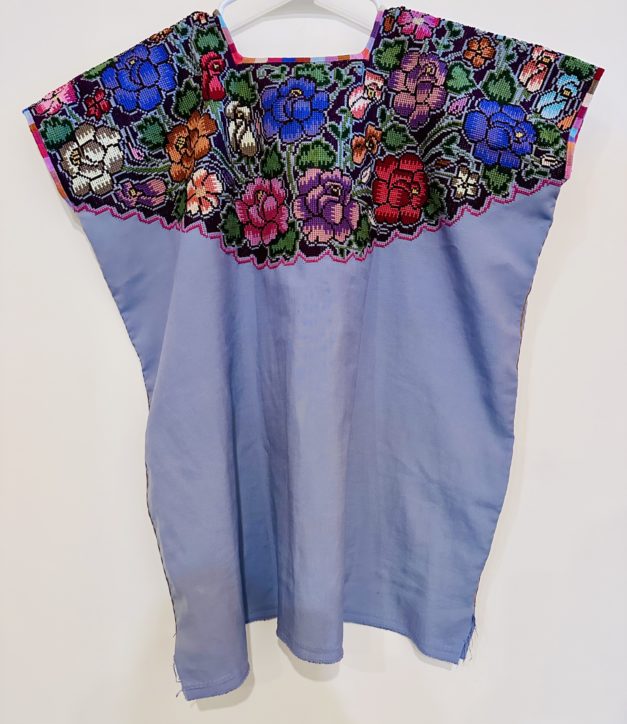First, the letter I sent to our most recent donors yesterday — people who made gifts over the last two weeks. Read on for a story from Kalisa Wells about giving out our masks on the streets of Oaxaca.
Dear Friends,
Your gifts over the last two weeks topped us off at receiving over $10,000 USD since Phase II of The Oaxaca Mask Project started on May 23, 2020 from 162 donors. We have made and distributed 2,710 face masks and more are in the making. Oaxaca is at the height of the Covid-19 outbreak. Sadly, very sadly, we have seen Oaxaca mortalities rise and our artisan villages are also very vulnerable.

So, the masks have helped immensely as we give them to people who are going to funerals and to public health clinics and markets, and just going about their every day lives. Staying at home, sequestered in houses, is difficult for the most disciplined of us to do! Yet, we know survival is dependent on it along with constant public education. We are working on that through the public health clinics in Teotitlan del Valle, Tlacolula de Matamoros, Santiago Ixtaltepec, and San Jeronimo Tlacochuhuaya. We have friends on the ground in each village who are helping us with mask distribution and education!

In addition, this total amount raised includes a gift to Teotitlan del Valle of hand sanitizer, alcohol, small portable pulse oximeters, plus a used Welch-Allyn vital signs monitor that clinic doctors requested. They have an urgent need to accurately test blood oxygen levels, temperature and blood pressure there. Four donors made this possible: Kate Rayner, Claudia Michel, Dr. Deborah Morris, and Boojie Cowell.
To contribute to The Oaxaca Mask Project, click here:
- $100 www.paypal.me/oaxacaculture/100
- $50 www.paypal.me/oaxacaculture/50
- $25 www.paypal.me/oaxacaculture/25
- Other amount www.paypal.me/oaxacaculture
What else can I tell you? We have masks going to vulnerable at risk people who live near the Zaachila dump and orphan children via the Oaxaca Episcopal Church, thanks to Kari Klippen-Sierra. Moises Garcia Guzman de Contreras is translating health messages and making videos in Zapotec for Tlacochahuaya. Cristy Molina Martinez continues to do the same in Teotitlan. Alan Goodin has taken up the cause for Santiguito, where he lives. We provide important income to seamstresses in El Tule, Oaxaca, Teotitlan, Tlacolula, Mitla and San Miguel del Valle. Jacki Cooper Gordon gave 100 masks to EnVia foundation who distributed them to women they support in Tlapazola, San Sebastian Abasolo, Santa Maria Guelace, and San Miguel. We sent extra fabric, too, so one of their seamstresses with use it for masks. Another 100 masks made by Rocio Bastida will go to Rachael Mamane, FoodforAll.mx, today, who will get them to taxi drivers and farmers who are part of Puente.org

I don’t know when I will return to my beloved Oaxaca. All my friends there tell me the cases are rising and the health care system is overloaded. I’m hoping for November this year, but I have no plans yet. When will Oaxaca Cultural Navigator resume our textile tours and programs? Quien sabe? I don’t know.
Meanwhile, I must do what I can to stay healthy in this time of covid-19. I must do what I can to elect a responsive government, and support justice for Black America. I will continue to focus on doing the right thing.
Thank you for joining me. Thank you for caring for Oaxaca. Say safe and healthy.
All my best, Norma
Now this from Kalisa Wells, also from yesterday, during her 12,685 step walk around Oaxaca with our blogger friend Shannon Sheppard:

“I love these walks, giving out the surprise mask for the very deserving people out there working for a few pesos on a Sunday. I put one of the last two masks I have in a plastic bag as we set out. We were way beyond Xochimilco (north of Niño Heroes de Chapultepec). We passed a señora making tortillas on a comal. She was in a dark entry way to her home, a step down from the sidewalk. She was older and was wearing a paper mask.
“I asked her for 10 pesos worth of tortillas. She had been making and putting them in a basket under a cloth, but for my 10 (that’s one peso each), she insisted on making them fresh, right then and there.
“I carry a clean tea towel in my bag, perfect for piping hot tortillas! I gave her the 10 pesos and your mask. She hesitated, not really understanding. I said it was a gift. You would have thought I gave her a diamond. She examined it, the workmanship and a nod of appreciation and thanks. It made my day!
“This is why I live in Mexico.”




















